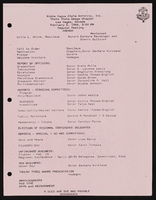Search the Special Collections and Archives Portal
Search Results
UNLV Libraries Collection of Barbary Coast Hotel and Casino Promotional Materials
Identifier
Abstract
UNLV Libraries Collection of Barbary Coast Hotel and Casino Promotional Materials includes clippings, press releases, press kits, and promotional materials for the Barbary Coast Hotel and Casino in Las Vegas, Nevada, dating from 1989 to 1997.
Archival Collection
UNLV Libraries Collection of Grand Casinos, Inc. Promotional Materials and Reports
Identifier
Abstract
The UNLV Libraries Collection of Grand Casinos, Inc. Promotional Materials and Reports includes annual reports, financial reports, newspaper and magazine clippings, press kits, press releases, and promotional materials for Grand Casinos, Inc. properties in Mississippi, Louisiana, Minnesota, and Nevada, dating from 1992-2002.
Archival Collection
Daly v. Daly Collection
Identifier
Abstract
The Daly v Daly Collection documents materials produced for and as a result of the lawsuits between Suzanne Daly (formerly Tim Daly), a male-to-female transgender woman, and Nancy Toews Daly from 1980 to 2003. The collection primarily focuses on the motions filed with the Nevada District Courts and Nevada Supreme Court and transcripts of the divorce, the battle for parental rights, and an allegation of civil rights violations.
Archival Collection
Christie Young Papers
Identifier
Abstract
The Christie Young Papers are comprised of Young's personal papers and journals between 1982 and 2011. These journals document Young's arrival to Las Vegas, Nevada and her involvement in several nascent Las Vegas lesbian, gay, bisexual, transgender, and queer (LGBTQ) organizations from 1982 to 1985 such as UNLV's Lesbian and Gay Academic Union (LGAU). The collection also includes materials related to her life in San Diego from 1985 to 1995. The collection also includes typed transcripts of all journal entries that relate to the Las Vegas LGBTQ community.
Archival Collection
Paul Sarno oral history interview
Identifier
Abstract
Oral history interview with Paul Sarno conducted by David G. Schwartz on July 13, 2007 for the Remembering Jay Sarno Oral History Project. Sarno begins by discussing the Sarno family, his grandparents, their Jewish heritage, and the early life of his uncle, Jay Sarno, and his father. Sarno then describes how his uncle married a lot later than his older siblings and he was the only one who had personal hobbies such as golf. Sarno then chronicles his uncle’s role as a businessman in Las Vegas, Nevada and how he only visited Las Vegas once because his father was a gambling addict. Lastly, Sarno discusses everything he knew about his uncle’s relationship with Allen Dorfman, the Teamster’s Union, and his legal troubles with the Internal Revenue Service.
Archival Collection

Alpha Kappa Alpha Sorority, Theta Theta Omega Chapter meeting agendas
Date
Archival Collection
Description
From the Alpha Kappa Alpha Sorority, Incorporated, Theta Theta Omega Chapter Records (MS-01014) -- Chapter records file.
Text
C. A. Earle Rinker Papers
Identifier
Abstract
The C. A. Earle Rinker Papers (1880-1960) contain materials that document the history of early twentieth century Goldfield, located in central Nevada, as well as the life of Rinker. Materials in the collection include correspondence, mining prospectuses, maps, ledgers, souvenirs, photographic negatives, and ephemera that document mining and daily life. Also included is biographical material that tells the story of Earle Rinker and his family before 1906 and after 1909, documenting his life in Indiana and Illinois.
Archival Collection
UNLV University Libraries Collection on Nevada Mining
Identifier
Abstract
The Nevada Mining Collection is comprised of records that document mining and mines in Nevada from 1842 to 1966. The majority of the collection includes records of various mines and mining companies located in the Esmeralda, Lincoln, Clark, White Pine, and Nye counties, dating from 1900 to 1928. The collection includes financial, administrative, and business related records; photographs of miners, mining camps, and towns; correspondence; maps; newspaper clippings, pamphlets, newsletters, and booklets.
Archival Collection

Robin Greenspun oral history interview: transcript
Date
Archival Collection
Description
Oral history interview with Robin Greenspun conducted by Barbara Tabach on February 09, 2017 for the Southern Nevada Jewish Heritage Project. In this interview, Greenspun discusses her family background and growing up in Las Vegas, Nevada. She talks about her early interest in the arts, working in television productions, and becoming a film director.
Text

Anita Tijerina Revilla oral history interview: transcript
Date
Archival Collection
Description
Oral history interview with Anita Tijerina Revilla conducted by Marcela Rodriguez-Campo on October 09, 2018 for the Latinx Voices of Southern Nevada Oral History Project. In this interview, Revilla discusses her early life in San Antonio, Texas. She talks about her decision to make education a priority, figuring out the college application process on her own, and her initial interest in social justice. Revilla talks about how her critical consciousness was developed, and her pedagogical approach to teaching. Revilla describes her role in the 2006 May Day march, advocating advocating for the queer community, and disrupting oppressive systems to increase educational access for students. Lastly, Revilla discusses ethnic studies and the history of inequality in the United States.
Text
